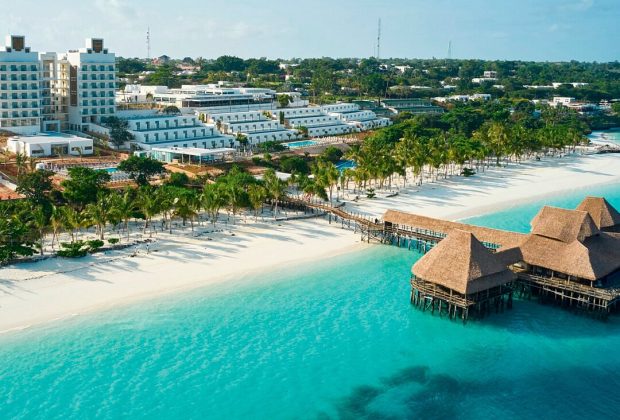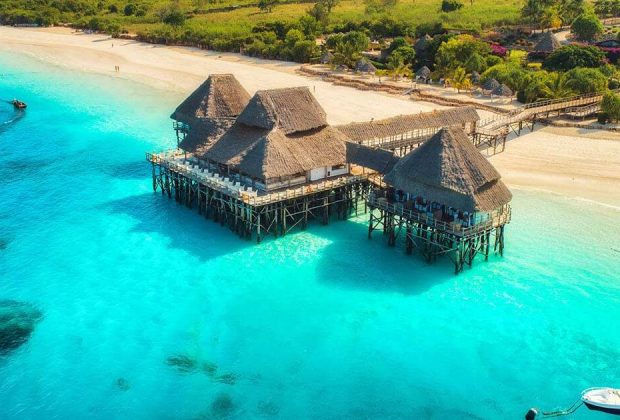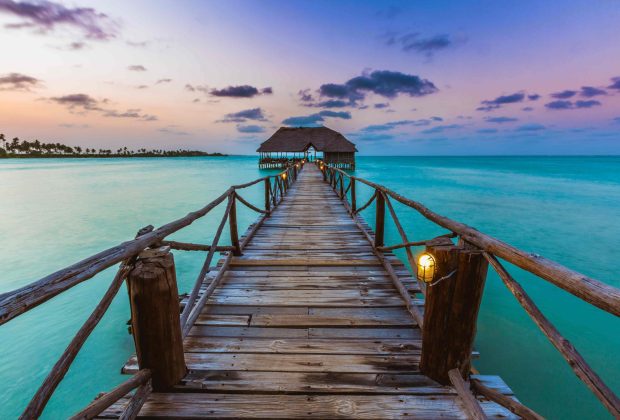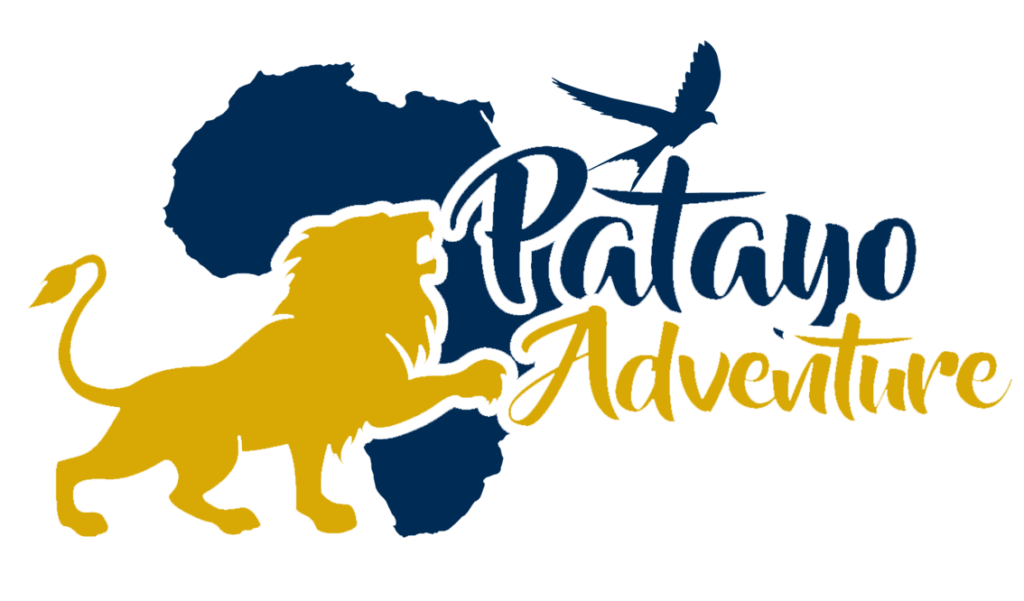8-Day Nyerere National Park (Selous) And Zanzibar Packages
Tour Overview
Embark on an 8-day journey blending the untamed beauty of Nyerere National Park (Selous) with Zanzibar’s tranquil paradise. Spend three days in the park, enjoying thrilling game drives, walking safaris, and boat rides along the Rufiji River. Witness Africa’s iconic wildlife and immerse yourself in diverse ecosystems. Then, retreat to Zanzibar’s idyllic beaches for four days of relaxation. Whether you’re soaking up the sun, exploring underwater treasures, or wandering through Stone Town, Zanzibar offers blissful indulgence. Enjoy comfortable accommodations, delicious meals, and domestic flights included for convenience. With experienced guides and ample leisure time, this adventure promises an unforgettable exploration of Tanzania’s natural wonders.



Day 1: Arrival in Nyerere National Park (Selous)
Your adventure begins as you arrive at Abeid Amani Karume International Airport (ZNZ) in Zanzibar. From there, you’ll embark on a domestic flight to Nyerere National Park (Selous). Upon arrival, you’ll be greeted by the vast wilderness and transferred to your lodge or camp. After settling in, you’ll embark on an evening game drive or boat safari along the Rufiji River, where you’ll have your first encounter with the park’s abundant wildlife. Enjoy dinner and spend the night surrounded by the sounds of the African bush.
Day 2: Full Day Safari in Nyerere National Park (Selous)
Wake up early for a thrilling game drive to witness the wildlife in action during the most active hours of the day. After breakfast at the lodge or camp, you’ll have the option to join a guided walking safari or a boat safari to explore different habitats within the park. Lunch will be served back at the lodge or camp before another afternoon game drive, offering more opportunities to spot iconic African animals. Return to your accommodation for dinner and relaxation under the starlit sky.
Day 3: Nyerere National Park (Selous) Safari
Enjoy another optional morning activity, whether it’s a game drive, walking safari, or boat safari, to immerse yourself further in the park’s beauty. After breakfast, bid farewell to Nyerere National Park as you transfer to the airstrip for your flight back to Zanzibar. Upon arrival, you’ll be transferred to your hotel, where you’ll have the evening at leisure to explore Stone Town or relax on the beach. Dinner can be enjoyed at a local restaurant (own expense) before retiring for the night.
Day 4-7: Zanzibar Beach Retreat
Spend the next four days indulging in the sun, sand, and sea of Zanzibar’s pristine beaches. Whether you choose to unwind on the shore, take part in water sports, or explore the island’s cultural treasures, there’s something for everyone to enjoy. Your hotel or beach resort will provide breakfast, lunch, and dinner each day, allowing you to fully immerse yourself in the island’s tropical paradise.
Day 8: Departure from Zanzibar
After breakfast at your hotel, it’s time to bid farewell to Zanzibar as you transfer to Abeid Amani Karume International Airport (ZNZ) for your departure flight. Reflect on the unforgettable memories of your safari and beach retreat as you board your plane, marking the end of your 8-day journey through Tanzania’s natural wonders.
Inclusions:
Accommodation: Typically includes lodging in hotels, resorts, or guesthouses, with options ranging from budget to luxury accommodations.
Meals: Most packages include daily breakfast, and some may also include other meals such as lunches or dinners, depending on the package type.
Airport Transfers: Airport pickup and drop-off services are usually provided as part of the package.
Transportation: Transport between attractions, tours, and activities as outlined in the itinerary. This may include guided tours, transfers, or rental vehicles.
Sightseeing Tours: Guided tours of popular attractions, such as Stone Town, spice plantations, beaches, and historical sites, with knowledgeable local guides.
Activities: Depending on the package, activities such as snorkeling, diving, spice tours, cultural experiences, and wildlife excursions may be included.
Entrance Fees: Admission fees to national parks, reserves, museums, and other attractions listed in the itinerary.
English-Speaking Guide: Services of a professional guide fluent in English to provide information, assistance, and insights during the tour.
Taxes and Service Charges: Most packages include taxes and service charges associated with accommodation, meals, and transportation.
Exclusions:
International Flights: Airfare to and from Zanzibar is typically not included in the package price.
Visa Fees: Costs associated with obtaining a visa for entry into Zanzibar, if required, are usually not included.
Travel Insurance: Travelers are advised to purchase travel insurance covering medical emergencies, trip cancellation, and other unforeseen circumstances.
Personal Expenses: Expenses such as souvenirs, alcoholic beverages, additional meals not included in the package, and gratuities for guides and staff are not typically covered.
Optional Activities: Some activities or excursions may incur additional fees, such as water sports, spa treatments, or private tours not included in the standard package.
Vaccinations and Medications: Costs associated with recommended vaccinations, malaria prophylaxis, and other medical precautions are not included.
Tips and Gratuities: Gratuities for guides, drivers, and hotel staff are usually not included and should be budgeted separately.
Airport Departure Taxes: Any departure taxes or fees imposed by airports are not typically included and must be paid by the traveler at the airport.
Additional Travel: Any travel outside of the specified itinerary, such as independent exploration or side trips, is not included in the package and may incur additional costs.
1. What is Zanzibar? Zanzibar is an archipelago off the coast of Tanzania in East Africa, consisting of two main islands, Unguja and Pemba, along with several smaller islets. It is known for its stunning beaches, rich history, vibrant culture, and diverse marine life.
2. How do I get to Zanzibar? Zanzibar is accessible by air and sea. The most common way to reach the islands is by flying into Abeid Amani Karume International Airport (ZNZ) located on Unguja Island. There are regular flights from major airports in Tanzania and other East African countries. Additionally, ferries operate between Zanzibar and the mainland ports of Dar es Salaam and Tanga.
3. What is the best time to visit Zanzibar? The best time to visit Zanzibar is during the dry seasons, which occur from June to October and from December to February. These months offer pleasant weather with minimal rainfall, making it ideal for beach activities, snorkeling, and exploring the island. However, Zanzibar can be visited year-round due to its tropical climate.
4. What are the popular attractions in Zanzibar? Zanzibar boasts a variety of attractions, including:
- Stone Town: A UNESCO World Heritage Site known for its narrow streets, historic architecture, and bustling markets.
- Spice Plantations: Guided tours offer insights into Zanzibar’s spice trade history and the chance to see exotic spices such as cloves, vanilla, and cinnamon.
- Beaches: Zanzibar is renowned for its pristine beaches, such as Nungwi, Kendwa, and Jambiani, which offer opportunities for swimming, snorkeling, and diving.
- Jozani Forest: Home to the endemic Red Colobus Monkey and other wildlife, this forest reserve offers nature walks and birdwatching.
5. Is Zanzibar safe for tourists? Zanzibar is generally safe for tourists, but it’s essential to take common-sense precautions, such as avoiding isolated areas at night and keeping belongings secure. Additionally, be mindful of cultural sensitivities and dress modestly, especially in Stone Town and around local communities.
6. What currency is used in Zanzibar? The official currency of Zanzibar is the Tanzanian Shilling (TZS), although US dollars are widely accepted, especially in tourist areas. It’s advisable to carry small denominations of cash, as credit card acceptance may be limited outside of major hotels and restaurants.
7. Do I need a visa to visit Zanzibar? Visitors to Zanzibar typically require a visa, which can be obtained upon arrival at the airport or port of entry. However, visa requirements vary depending on your nationality, so it’s advisable to check with the nearest Tanzanian embassy or consulate before traveling.
8. What languages are spoken in Zanzibar? The official languages of Zanzibar are Swahili and English. Swahili is widely spoken among locals, while English is commonly used in tourist areas and by those in the hospitality industry. Learning a few basic Swahili phrases can enhance your travel experience and interactions with locals.
9. Are there any cultural customs I should be aware of in Zanzibar? Zanzibar has a predominantly Muslim population, so it’s essential to respect local customs and traditions. Modest clothing is recommended, particularly when visiting religious sites or interacting with locals. During the Islamic holy month of Ramadan, be considerate of those fasting by avoiding public eating, drinking, and smoking during daylight hours.
10. What vaccinations do I need before traveling to Zanzibar? It’s advisable to consult with a healthcare professional or travel clinic before visiting Zanzibar to ensure you are up-to-date on routine vaccinations and to discuss any additional immunizations recommended for travel to the region. Vaccines for hepatitis A, typhoid, and yellow fever may be recommended depending on your travel plans and medical history. Additionally, antimalarial medication is often recommended for travelers to Zanzibar.
